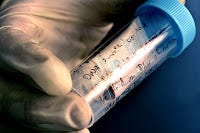Supreme Courts DNA ruling is worse that most Americans realize

If you’ve done nothing wrong, police and other law enforcement don’t worry you, right?
They should, according to an analysis today of a U.S. Supreme Court decision that said police can take a DNA sample after an arrest to see if it matches any samples from unresolved crimes in a database.
The concern is that if taking DNA samples from those who are not convicted is justified, it also would be permitted to take DNA samples from anyone who flies on an airplane, applies for a driver’s license or attends a public school, according to John Whitehead, a constitutional expert with the Rutherford Institute.
The opinion for the five-justice majority, written by Anthony Kennedy, said taking and analyzing a cheek swab of the arrestee DNA is “like fingerprinting and photographing, a legitimate police booking procedure that is reasonable under the Fourth Amendment.”
“Make no mistake about it: because of today’s decision, your DNA can be taken and entered into a national database if you are ever arrested, rightly or wrongly, and for whatever reason,” Justice Antonin Scalia said in a dissent.
More than two dozen states and the federal government now take DNA swabs after arrests. But a Maryland court said it was illegal for officials to take Alonzo King’s DNA without a warrant from a judge.
That state court said King had a “reasonable expectation of privacy against warrantless, suspicionless searches.”
He had been linked to a decades-old criminal case through the DNA swab.
The Supreme Court now has reversed that.
Kennedy was joined in the majority by Chief Justice John Roberts and Justices Samuel Alito, Clarence Thomas and Stephen Breyer. Scalia was joined in dissent by Justices Ruth Bader Ginsburg, Sonia Sotomayor and Elena Kagan.
The controversy was over whether police could take the samples before a conviction or without a judge’s warrant.
Whitehead called the decision a “devastating ruling.”
“Any American who thinks they’re safe from the threat of DNA sampling, blood draws, and roadside strip and/or rectal or vaginal searches simply because they’ve ‘done nothing wrong,’ needs to wake up to the new reality in which we’re now living,” he wrote.
“As the Supreme Court’s ruling in Maryland v. King shows, the mindset of those in the highest seats of power – serving on the courts, in the White House, in Congress – is a utilitarian one that has little regard for the Constitution, let alone the Fourth Amendment. Like Justice Scalia, all I can hope is that ‘today’s incursion upon the Fourth Amendment’ will someday be repudiated,” Whitehead said.
“As disheartening as this ruling is, it is simply one more volley in a long line of attacks on our right to be free from unreasonable searches and seizures by government agents. In the past few years, the Supreme Court has determined that freedom from unreasonable government intrusion, a core component of the United States Constitution, is of little importance in an age of surveillance and security at any cost” Whitehead said.
https://www.rutherford.org/publications_resources/tri_in_the_news/if_youve_done_nothing_wrong_you_still_need_to_worry
Collecting DNA at arrest: Policies, practices and implications report



